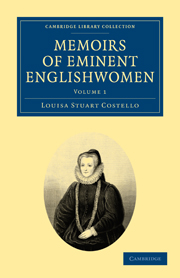MAGDALEN HERBERT
Published online by Cambridge University Press: 05 July 2011
Summary
The poet—whose pious and excellent spiritual songs have retained their popularity even to our days, notwithstanding the quaint conceits with which the sense is occasionally disfigured—owed, as is frequently the case, much that was valuable in his character to the care, the precepts, and the example of his mother, who was the youngest daughter of Sir Richard, and sister to Sir Francis Newport, of High Arkall, in Shropshire—a family remarkable for their loyalty, and who, as Walton observes, for that cause “have suffered much in their estates, and seen the ruin of that excellent structure, where their ancestors have long lived, and been memorable for their hospitality.”
Magdalen was the mother of seven sons and three daughters, which she was in the habit of saying, “was Job's number, and Job's distribution.” For all these blessings she was grateful to Providence, and also “that they were neither defective in their shapes nor in their reason; and very often,” says her biographer, “would she reprove them that they did not praise God for so great a blessing.”
To educate and watch over these children was the chief care of the Lady Magdalen, who became early a widow, and under her eye George and two of his brothers were instructed by an able tutor, her chaplain, till, after being at Westminster school, George was transferred to Trinity College, Cambridge, about 1608, where his mother's watchful care followed his progress in learning, never wearying of her charge, and ceaselessly anxious that the seeds of virtue and piety which she saw within him should bring forth good fruit.
- Type
- Chapter
- Information
- Memoirs of Eminent Englishwomen , pp. 380 - 402Publisher: Cambridge University PressPrint publication year: 2010First published in: 1844

